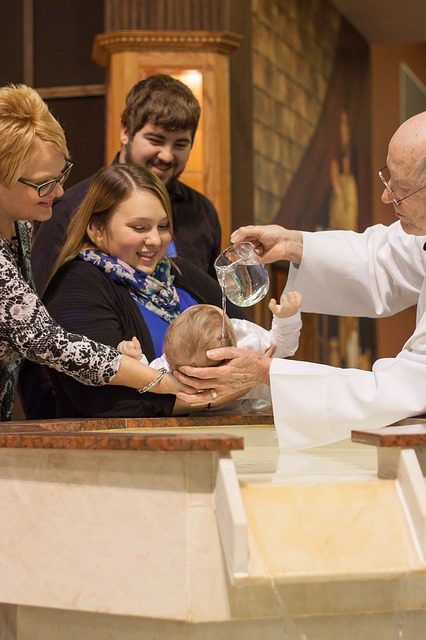When Father Andres Arango of St. Gregory Catholic Church in Phoenix, Arizona, did baptisms, he got in the habit of saying, “we baptize you in the name of the Father, Son, and Holy Spirit.” But the traditional formula is “I baptize you. . . .”
The Phoenix archdiocese as ruled that using the wrong wording means that the baptisms he has performed–which number in the thousands over the course of his 20 years in the ministry, not only in Phoenix but in San Diego and Brazil–are invalid. That is to say, the people he has baptized, most of them as infants, are not really baptized. They all need to be re-baptized.
Rev. Arango used the first person plural, rather than the first person singular, to convey the sense that the entire congregation is involved in the baptism. This was in the spirit of Vatican II, the council that loosened many Catholic practices, though not this one. Reportedly, Rev. Arango is not the only priest has been baptizing in this way.
The decision, which reportedly had the approval of Pope Francis, is based on the doctrine that the priest, not the congregation, performs the baptism. Also that baptism works ex opere operato–“from the work that is worked”–by virtue of the action, apart from faith or any other consideration, so that if the work is not done properly, it isn’t a work. (For a good explanation from the Catholic point of view, read this.) What all of this shows, however, are the problems with the Roman Catholic doctrine of baptism.
The words of baptism are, indeed, important, since it is the Word that makes the water a baptism. But here is that Word, in the Great Commission of Our Lord: “Go therefore and make disciples of all nations, baptizing them in the name of the Father and of the Son and of the Holy Spirit” (Matthew 28:19).
What makes a baptism is not a priest but the Triune God. A person is baptized not in the name of the priest but in the name of the Holy Trinity. Furthermore, the reason why baptism is efficacious is because it conveys faith, not because of the way the rite was performed. Let’s let Luther explain it. To the question “how can water do such great things,” the Small Catechism says,
“Certainly not just water, but the word of God in and with the water does these things, along with the faith which trusts this word of God in the water. For without God’s word the water is plain water and no Baptism. But with the word of God it is a Baptism, that is, a life-giving water, rich in grace, and a washing of the new birth in the Holy Spirit.”
In the Diocesan decision in the Rev. Arango case, faith does not enter into the question at all. Now “thousands” of people do not realize that they have not been baptized, but assume that they are. After all, infants have no recollection about who baptized them and how. Many now are probably good Catholics. But now, regardless of their faith, their lack of baptism condemns them. Compounding the problem is that all of the sacraments, according to Catholic theology, are invalid–or even damning–for someone who receives them without being baptized. Taking Holy Communion with0ut being baptized threatens one’s soul. Confession and Absolution has no efficacy apart from baptism. The sacrament of marriage doesn’t exist for the unbaptized. Some of the 20-somethings invalidly baptized by Rev. Arango may think they are married, but they are actually living in fornication. (The diocese has set up a website to address issues such as this.)
The Catholic church is saying that God would surely not punish anyone for lapses of this kind, though they do need to be made up for by getting re-baptized, re-confirmed, re-married, etc. That’s is small comfort, though, especially for the most devout Catholics, and especially for a sacrament that is designed to give us assurance of our salvation.
To be sure, invalid baptisms are possible. Many mainline liberal Protestants, influenced by feminist theology, have started using in “non-gendered” language, baptizing “in the name of the Creator, the Redeemer, and the Sanctifier.” Descriptors that aren’t names at all, unlike “the name” of the Father, the Son, and the Holy Spirit. Also, some Pentecostals–who believe in a separate “baptism of the Holy Spirit”–are baptizing “in the name of Jesus.” These folks need to be baptized, as Christ Himself commands, “in the name of the Father and of the Son and of the Holy Spirit” (Matthew 28:19).
Even in terms of Roman Catholic theology, though, the decision raises some questions. As Michelle Boorstein has observed, the Orthodox Church uses neither “I baptize you” or “We baptize you” but the passive voice: “This person is baptized. . . .” And yet, the Catholic church has accepted Orthodox baptisms for hundreds of years.
HT: Steve Bauer
Image by HollyGirl18 from Pixabay














